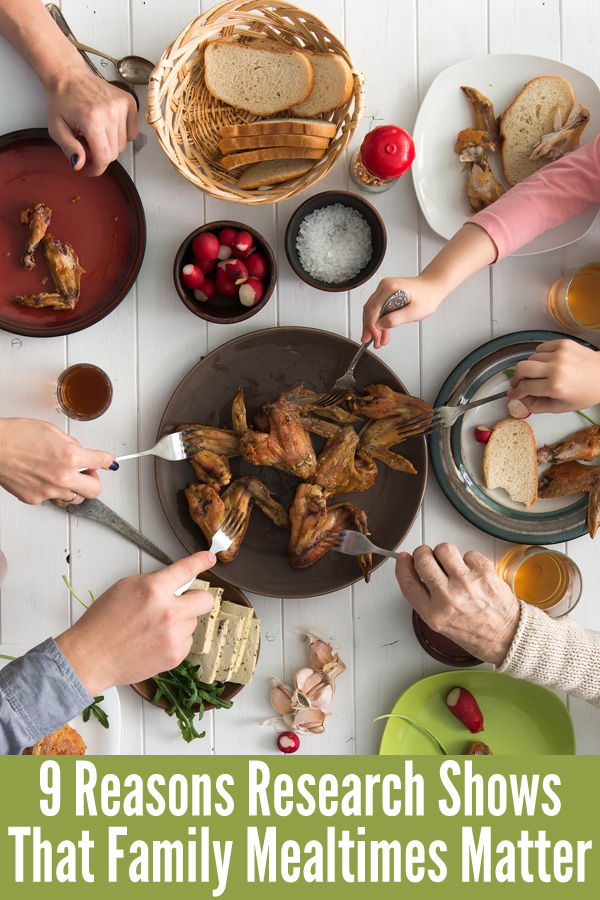9 Reasons Research Shows That Family Mealtimes Matter
Long work hours, dancing classes, sporting events, school or community meetings – there are many potential interruptions to the act of gathering the family together around the dining table in today’s busy family schedule but the research shows that making a regular commitment is worth the effort, positively impacting nearly every area of a child’s development. There is however no need to despair if it is simply not possible for your whole family to gather for every meal, as today we are sharing not only a list of nine important benefits that are backed by the research but also nine suggestions for making the most of those opportunities you do have to get everyone together.
9 Reasons Research Shows That Family Mealtimes Matter
1. Teens who share regular meals with their parents have been found to score better across a range of wellbeing indicators, with lower levels of depressive behaviours.1
2. Hammond & Fiese (2011)2 found that sharing family meals 3 or more times a week positively impacted healthy eating behaviours when compared to those who shared in fewer than 3 meals together. These children were more likely to be within a normal weight range and to make healthier dietary choices, and less likely to engage in disordered eating.
3. Studies conducted by the US National Center on Addiction and Substance Abuse (CASA) 3 found that teens involved in three or more family dinners a week were less likely to have abused prescription drugs or to have used illegal drugs, smoked cigarettes or to have tried alcohol.
4. CASA 3 also reports that teens who dined with their families 5-7 times per week reported having high quality relationships with their parents.
5. Younger children gain a greater sense of security and belonging within the family when they share in regular family meals. 4
6. Children engaging in regular family meals begin to learn more about their family heritage and history and this knowledge resulted in closer family relationships, higher self esteem and a greater sense of control over their own lives. 5
7. Children havw also demonstrated increased levels of resilience in the face of external stressors. 5
8. Regular family meals provide opportunity for parents to model (and therefore, children to learn) positive communication and social skills, such as using table manners and maintaining conversation.6
9. Mealtime conversation provides a great context for the language and vocabulary development of young children.7
So we know it’s important but how do we make the most of the times we are all available to eat together? Here are some suggestions based on what works for our family.
9 Ways to Make the Most Of Family Mealtimes
1. As Tricia shared in her post, Being a Mindful Mum in a Busy World, mealtime connections can happen at any time of the day, not just at dinner time. They key is consistency, with research suggesting families eat together at least three times a week. be consistent – feelings of connection and closeness, stability
2. Keeping younger children at the table can be tricky but involving them in serving the meal can most certainly help, as can choosing foods that children can assemble at the table themselves. Here are 5 family friendly meals that do just that.
3. Encourage conversation. Try these Mealtime Conversation Starters or printable Family Conversation Cards.
4. Share family stories. Tell stories from your own childhood and those that have been passed down from generation to generation.
Download a copy of our printable proverb quote for your home here.
5. Make it social. Invite extended family or friends to join you for meals sometimes. Nothing fancy – strive instead for friendly, cosy, warm and simple.
6. Play together. Some of our favourite board and card games are perfect as table games and so playing at the dinner table is a regular occurrence in our house. You can even serve a dinner of finger foods or appetisers to make it easier to eat and play.
7. Add a little magic. My girls love it when, for something a little bit different, we have dinner by candlelight, and there are many simple ways to create a little magic at mealtimes every now and then. Try letting each child have a turn at being the family DJ by choosing some music to set the mood. Or get creative with a spontaneous backyard picnic or breakfast for dinner. Pretend your family dinner table is a table in a restaurant or enjoy a meal themed to a favourite movie or book.
8. Make it screen free. Turn off the TV and put phones and tablets out of reach to optimise the opportunity to connect with each other.
9. Be just there. This is one that I often struggle with – switching off the mental distraction of being a busy, working mum to be just there, in the moment, with my family.
And how often do we eat together, I hear you ask? Mostly we manage to eat dinner all together at the table at least four to five times a week.
How often does your family eat together?
References
1. Musick, K & Meier, A. (2012)Assessing Causality and Persistence in Associations Between Family Dinners and Adolescent Well-Being. Journal of Marriage and Family.
2. Hammons, AJ & Fiese, BH. (2011) Is Frequency of Shared Family Meals Related to the Nutritional Health of Children and Adolescents? American Academy of Pediatrics
3. The National Center on Addiction and Substance Abuse (CASA) (2012). The importance of family dinners VIII.
4. Satter, E. (1987). How to get your kid to eat…but not too much. Palo Alto, CA: Bull Publishing Co.
5. Duke, MP., Fivush, R. Lazarus, A. & Bohanek, J. (2003) Of Ketchup and Kin: Dinnertime Conversations as a Major Source of Family Knowledge, Family Adjustment, and Family Resilience.
6. Lyttle, J., & Baugh, E. (2008). The Importance of Family Dinners. Gainesville, FL: Cooperative Extension Service, Institute of Food and Agricultural Sciences, University of Florida. FY 1054.
7. Snow CE., Beals DE. Mealtime talk that supports literacy development. New Dir Child Adolesc Dev. 2006;(111):51-66.




This is really great information that all families need to know about!
Thank you so much, Cindy 🙂